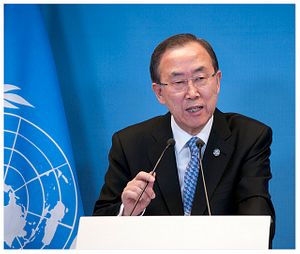United Nations Secretary General Ban Ki-moon recently completed a tour of Central Asia, using the opportunity to express his fears of growing human rights abuses, especially in Tajikistan, Turkmenistan, and Uzbekistan. While speaking in Ashgabat, Ban noted that: “Curbing freedoms may create an illusion of stability in the short-run. Things may seem calm on the surface. There may not be protests on the streets. But the denial of free expression leads to a brewing underneath and ultimately a breeding ground for extremist ideologies.”
Ban was impressed by the pace of Central Asia’s economic development and its progress against UN Millennium Development Goals. But the UN chief pressed on human rights – a raw nerve for most of countries in the region – particularly in Uzbekistan. Ban affirmed that Uzbekistan has initiated a number of good laws. “But laws on the books should be made real in the lives of people.” While he confirmed that Tashkent has made “important progress in eliminating child labor in the cotton sector. Now more must be done to address the mobilization of teachers, doctors and others in cotton harvesting, and prevent the maltreatment of prisoners.”
Ahead of his visit, Human Rights Watch submitted a detailed memorandum to the secretary general on the dismal human rights record across the region. Amnesty International called on the UN to urge Uzbekistan to end torture and honor its international human rights obligations. Earlier, almost 40 international NGOs sent a joint letter to Ban Ki-Moon, urged him to end forced labor. The appeals seemed to have an effect; Ban was clear that “there can be no peace and development without human rights.”
To meet its obligations on children’s rights Uzbekistan abolished the practice of mobilizing under-age workers for the cotton harvest. It has plugged the gap by mobilizing teachers and doctors. Under threat of dismissal, these professionals have been forced to go into the fields for a month personally or pay an amount equal to almost half their wages. All who refused to submit to the order subsequently lost their jobs on trumped up charges. Meanwhile, local human rights activists along with Radio Free Europe/Radio Liberty have recorded about two dozen fatal incidents in the last cotton season alone.
It has already been several years since more than 170 international manufacturing companies signed a pledge to boycott Uzbek cotton under the umbrella organization Responsible Sourcing Network. Among the signatories are top apparel brands: Adidas, Disney, Gap, H&M, IKEA, JC Penney, Macy’s, Lacoste, Nike, Puma, Wal-Mart, Zara, and many others. Since 2006, as a response to this boycott and temporary EU and U.S. sanctions following the Andijan events, Uzbekistan began holding its own International Cotton and Textile Fair and reoriented its consumer markets to Southeast and South Asia.
Indeed, cotton production has become a curse for the entire region. Last fall, NASA dramatically concluded that the Eastern Lobe of the Aral Sea has gone completely dry. Ban could not hide his indignation after a visit to the Aral Sea basin in 2010 and in his video message to participants at an international donor conference last October in Urgench, Uzbekistan, he emphasized that “the root of the problem is poor water management.” In April 2014, at the VII World Water Forum in Korea, an Uzbek representative acknowledged for the first time that now “the task is not to save the water, but people.”
Central Asian governments justify their harsh policies as necessary in their struggle against religious extremism. Yet Pillar (IV) of the United Nations Global Counter-Terrorism Strategy in Central Asia specifically obliges all five countries in the region to ensure respect for human rights, and calls the rule of law the foundation of the fight against terrorism.
Uzbekistan seems to be neglecting these calls once again. It should be noted that Uzbekistan does have an ombudsman, at least nominally, but both Uzbekistan’s public and the international community will be hard pressed to recall it playing any meaningful role in the defense of victims of human rights violations.
While Ban Ki-moon was prepared to speak boldly on human rights, no Uzbek TV channel was bold enough to air them. The official Uzbek news agency, UzA, made no mention of human rights in its press release. Curiously enough, the press office of the UN Country Office in Uzbekistan appeared to make its own omissions. Although the official website did feature Ban Ki-moon’s remarks for the press, for some reasons the key points on human rights have not been relayed through either at its Facebook, or Twitter accounts, effectively avoiding wider public debate.
Zabikhulla Saipov is a political scientist from Central Asia with no political or institutional affiliation. You may wish to follow him at @zabisaipov

































